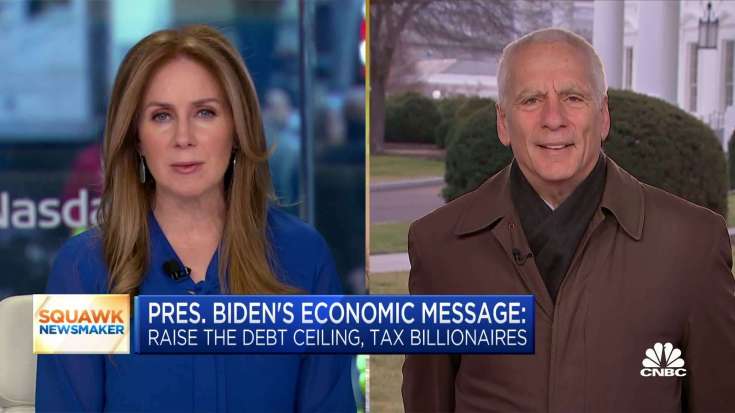Elon Musk attends the 2022 Met Gala at the Metropolitan Museum of Art.
Angela Weiss | AFP | Getty Images
President Joe Biden drew loud cheers during his State of the Union address Tuesday night when he proposed a new tax on the rich.
“Pass my proposal for a billionaire minimum tax,” Biden told Congress. “Because no billionaire should pay a lower tax rate than a school teacher or firefighter.”
Biden’s billionaire tax, however, also hits top millionaires. And rather than simply raising tax rates, it effectively taxes wealth, including unsold stocks, bonds and real estate.
According to the White House explainer on the tax, which Biden first proposed last year, the billionaire minimum tax would require households with total net wealth over $100 million to pay a minimum effective tax rate of 20% on an expanded measure of income that includes unrealized capital gains.

Under the plan, households would calculate their effective tax rate for the minimum tax. If it fell below 20%, they would owe additional taxes to bring their effective rate to 20%.
The big change is taxing unrealized capital gains as income. Currently, if a taxpayer owns a stock, bond, real estate or other assets, they don’t typically owe capital gains until it’s sold. Biden proposes taxing “unrealized gains,” meaning a tax on the annual paper gain in value even if it’s not sold.
So, if a tech founder owns $1 billion in stock and the stock increases in value to $1.5 billion during the year, they would owe a tax of up to $100 million on the $500 million paper gain – even if they didn’t sell a single share.
The White House says it would account for losses with credits, and by spreading payments and credits out over time. Taxpayers can spread the first payment — which is a tax on their total wealth — over nine years. Payment for the tax on annual gains after that can be spread over five years, which the White House says “will smooth year-to-year variation in investment income.”
Yet taxing unrealized gains is increasingly complicated with today’s wealthy – most of whom have fortunes tied to volatile tech stocks that swing wildly from year to year.
Take the example of Elon Musk:
- If the billionaire minimum tax started in 2020, he would have owed a tax of $31 billion on his total net worth, which at the start of the year was $156 billion.
- In 2021, his net worth increased by $121 billion, so he would owe $24 billion in taxes for the year.
- In 2022, however, his net worth fell by $115 billion on Tesla‘s stock decline. If he already paid the 2021 tax, he will have paid billions of taxes on wealth that he no longer has.
- The government would then have to send him a $23 billion refund check. Or any credit for 2022 would take years to use, and would depend on Tesla’s stock recovering.
- If Musk had needed to take a margin loan sell stock to pay the 2021 tax, those costs wouldn’t be offset with a tax credit.
“Applying the tax to tech stocks, and other assets that are volatile, is tricky,” said Steve Rosenthal, a senior fellow at the Urban-Brookings Tax Policy Center. “What if the multi-millionaire is stock rich, but has little cash to pay the tax? Or is unable to borrow large sums against the volatile stock? And what happens if after a quick climb, the stock declines rapidly? Would the government write large refund checks?”
The Biden administration says that aside from restoring “fairness” to the tax code, the billionaire minimum tax would raise $360 billion in added revenue over 10 years. The White House said the tax would apply only to the top one-one hundredth of one percent (0.01%) of American households. It said more than half the revenue will come from households worth more than $1 billion.
Opponents say that aside from potentially being unconstitutional, the billionaire minimum tax would be difficult to administer – especially for an IRS already understaffed.
“Realization-based taxation is the norm around the world,” said Erica York, senior economist and research manager with The Tax Foundation’s Center for Federal Tax Policy. “And for good reason, because the alternative of taxing unrealized gains would be extremely complex and administratively costly.
Added Rosenthal: “The super-rich own lots of assets, which would require lots of valuations. How would the IRS determine whether multi-millionaires filed properly?”


